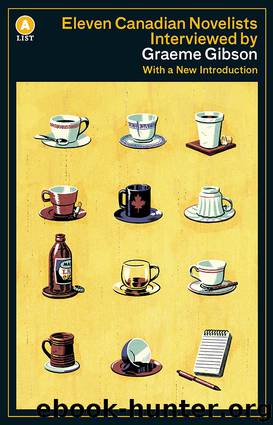Eleven Canadian Novelists Interviewed by Graeme Gibson by Graeme Gibson

Author:Graeme Gibson
Language: eng
Format: epub
Publisher: House of Anansi Press Inc
Published: 2014-07-27T16:00:00+00:00
Margaret Laurence
FICTION
This Side Jordan
The Tomorrow-Tamer
The Stone Angel
A Jest of God
The Fire-Dwellers
Jason’s Quest
A Bird in the House
NON-FICTION
A Tree for Poverty
The Prophet’s Camel Bell
Long Drums and Cannons
Margaret Laurence was born in Neepawa, Manitoba, in 1926.
Okay . . . some of the questions aren’t going to make any sense in your particular context, and if so, just say so. I’ll begin with a question about the novel and what the attraction of the novel is for you as opposed to other forms of writing.
Well, I don’t know about the attraction of the novel against other forms of writing, Graeme. I have written a lot of short stories as well, and it seems to me that it’s really the material itself which decides the form. Some things seem suitable for a short story and others for a novel. I don’t feel that the short story is any less difficult a form; in fact in some ways it’s more difficult. I think generally speaking, with my short stories anyway, I’ve had one sort of main theme into which I go fairly deeply, whereas with the novel I have a whole lot of interrelated themes and dilemmas. I don’t think you necessarily do more in the novel — it doesn’t attract me any more than the short story — it’s just that the material itself chooses the form.
Right. And then the short story material is more concise or more intense or limited in scope . . . I don’t mean in meaning, but in scope?
One is tempted to say that in a novel you have more scope. I’m not so sure that’s true. I think one generally tends to deal in a novel with a greater number of themes, and of course a greater number of individual dilemmas, than in a short story. I don’t believe that a novel is any less a concise form than the short story. It doesn’t matter how long a novel is — you still can’t afford to waste any words. It can be six hundred pages, if it really needs to be six hundred pages, but it still is a very tight form in that sense. . . . You know, if you have this kind of feeling of respect for words, you really can’t afford to waste any of them.
Okay, how do you find films, for example Rachel, Rachel? Did you find any attraction in films or do you learn anything as a novelist from films or any of the. . . .
I think that every writer, in this particular time, in our age, has learned a great deal from both films and from TV, not consciously, perhaps, but I think that these things have influenced writing. My writing has always tended to be very visual, which is just partly my natural way of doing things. But yes, I do feel that — in ways I find difficult to analyze — my own writing has been influenced by both films and TV in the sort of visual techniques that we use, although I think that the two forms are totally different.
Download
This site does not store any files on its server. We only index and link to content provided by other sites. Please contact the content providers to delete copyright contents if any and email us, we'll remove relevant links or contents immediately.
| African | Asian |
| Australian & Oceanian | Canadian |
| Caribbean & Latin American | European |
| Jewish | Middle Eastern |
| Russian | United States |
4 3 2 1: A Novel by Paul Auster(11034)
The handmaid's tale by Margaret Atwood(6837)
Giovanni's Room by James Baldwin(5872)
Big Magic: Creative Living Beyond Fear by Elizabeth Gilbert(4718)
Asking the Right Questions: A Guide to Critical Thinking by M. Neil Browne & Stuart M. Keeley(4566)
On Writing A Memoir of the Craft by Stephen King(4205)
Ego Is the Enemy by Ryan Holiday(3982)
Ken Follett - World without end by Ken Follett(3968)
The Body: A Guide for Occupants by Bill Bryson(3789)
Bluets by Maggie Nelson(3705)
Adulting by Kelly Williams Brown(3663)
Guilty Pleasures by Laurell K Hamilton(3578)
Eat That Frog! by Brian Tracy(3508)
White Noise - A Novel by Don DeLillo(3430)
The Poetry of Pablo Neruda by Pablo Neruda(3358)
Alive: The Story of the Andes Survivors by Piers Paul Read(3303)
The Bookshop by Penelope Fitzgerald(3221)
The Book of Joy by Dalai Lama(3212)
Fingerprints of the Gods by Graham Hancock(3206)
